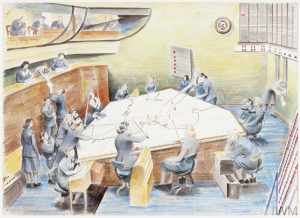What do you believe? I am not talking about whether the earth is flat, or if the moon is made of green cheese, or do fairies exist. (For reference, my answer to all three questions is a firm ‘no’.) I am concerned with versions of history. It is said that history is written by the victors, which does not augur well for objectivity. But who was first to express it in those terms? Even such an apparently simple question has no simple answer. Winston Churchill repeated the saying. He certainly had a gift for an apposite and memorable phrase. The sentiment predates him. There are many other contenders to be the originator. Napoleon called history a fable agreed upon. I am not even going to question whether he made the statement or not. It remains a good quote. Contemporary versions of history are frequently revised, and sometimes changed dramatically, when additional information emerges.
Recently I visited the Battle of Britain Bunker in Uxbridge. This is the place from which Air Vice Marshall Keith Park commanded 11 Group of the RAF in the summer of 1940. He bore responsibility for the defence of South East England and London in particular. The main room has a large map on which symbols indicating the strength and location of formations from both sides could be displayed. One wall is taken up with information on the status of the defending squadrons. E.g. On standby, in the air, engaged with the enemy, refuelling. It was quite atmospheric, and well worth the visit.
Image: IWM (Art.IWM ART LD 2320)
The day that forms the focal point of the display is 15th September. All of 11 Group’s resources, as well as squadrons from neighbouring Groups, were engaged in repelling a series of mass attacks. Hundreds of individual combats took place. The first claim made by the RAF was that 176 German planes had been destroyed by fighters with at least another nine hit by anti-aircraft guns. The true number is about one third of this. I say ‘about’ because even today the true number is the subject of debate. I have seen figures of 56 and 60. Researchers have examined the detailed records from both sides. Crash sites have been correlated to combat claims. Gun camera films have been checked. And we still do not know the exact figure.
Does the exact number matter? The Luftwaffe continued attacking for several weeks. The RAF continued defending in apparently undiminished strength. We now know that the events of that day helped to convince the Germans that they were not going to going to enjoy a sufficient command of the skies to be able to launch an invasion. Their plans changed. The exact number probably does not matter. The overall picture that was created by those events most certainly does matter.
Family history operates at a different level. The fighter pilots, the operation room plotters, the ground crews, they all have a personal story to be told. Every single one is important, especially to members of those families.
I would argue that those multiple family histories represent the pixels that combine to create the ‘big picture’.

